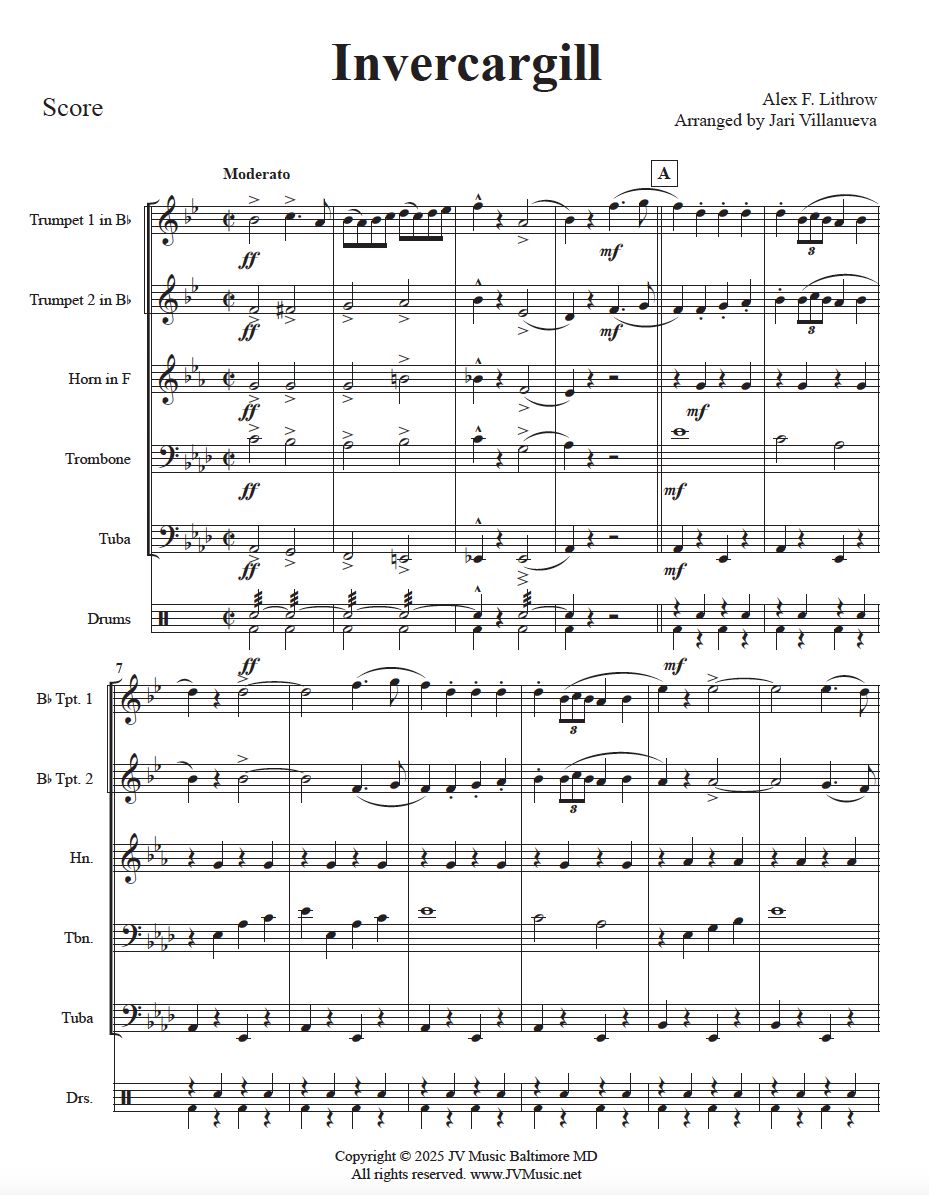

The JV Music Store: If Your Question Has the Word Music in It, Look No Further!
Welcome to the JV Music store! We are your source for finding arrangements for Brass Quintet, Brass Ensembles, Concert Band and more.
All our arrangements are by Jari Villanueva, a former member of the Air Force, where he served for 23 years with the United States Air Force Band in Washington, DC. During his time in the band, he held various roles, including trumpeter, bugler, assistant drum major, staff arranger, and music copyist. He is regarded as the country’s foremost expert on military bugle calls, particularly the call of Taps, which is played at military funerals.
Invercargill March for Brass Quintet Arranged by Jari Villanueva
Score 2 Trumpets, Horn, Trombone, Tuba, Drums. Opt parts for Eb Alto and TC Baritone
SCORE AND PARTS DOWNLOADED UPON PAYMENT
Invercargill March, composed by Alex Lithgow and named after his hometown of Invercargill in New Zealand's South Island, is considered one of the most popular marches worldwide. It ranks alongside John Philip Sousa's "Stars and Stripes Forever," Kenneth Alford's "Colonel Bogey March," and Johann Strauss' "Radetsky March." Alex F. Lithgow (December 1, 1870, Glasgow, Scotland - July 12, 1929, Launceston, Australia) was known as the so-called March King of the Antipodes. Although born in Scotland, his family moved to Invercargill, New Zealand, when he was six years old. At 16, he became the principal cornet soloist, and four years later, after winning the cornet solo championship at the first national band contest (in Dunedin, 1890), he was promoted to bandmaster. In addition to the cornet, he was also an excellent violinist and, beginning when he was 15, he worked with several symphonies during his career. Lithgow’s first published march, Wairoa, was written when he was 15 and served as a second cornet player in the Invercargill Garrison Band. Out of his more than 50 marches, his Invercargill March became a global hit after an arrangement for wind band by L. P. Laurendeau was published by Carl Fisher in 1913. Besides marches, Lithgow composed music for orchestra, piano, voice, and concert band. Among his many concert works, band researcher Stanley Newcomb from New Zealand considers the suites In Sunny Australia and At the Movies, the march intermezzo Australia Today, and the waltzes Tasma’s Beauties, Bessica, and To Vera to be some of his best compositions. However, the composer’s royalties did not sustain his family. Lithgow’s health began to decline in his early 50s, and he was compelled to cease most of his conducting activities. Determined to keep composing, he worked as a printer for the Examiner newspaper during the day and composed music at night. The exhausting schedule soon took its toll; he became an invalid and died in 1929, leaving behind his widow, one son, and two daughters. Highly respected as a cornetist, composer, and conductor, and admired as a kind and patient person, Lithgow’s funeral service was attended by thousands of people who walked the three miles to the cemetery. Since his death, memorial plaques have been placed in both Tasmania and New Zealand.
